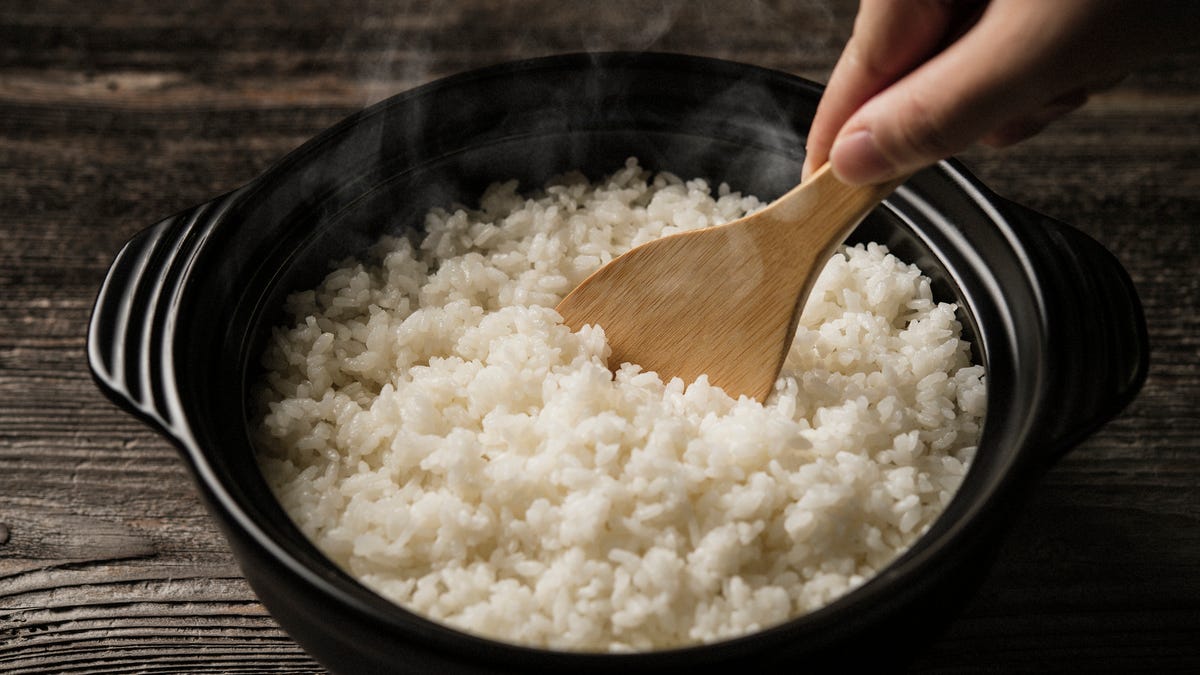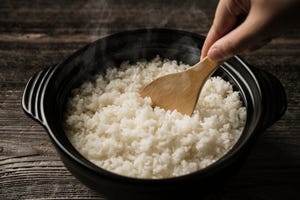
Rice is a pantry staple that pairs well with almost any meal under the sun. Eat it with eggs, chicken, fish or beef. Crisp up boiled rice on a skillet or steam it. Choose from brown rice or white, short grain or long. There are so many possibilities, so many ways to prepare and eat it, it’s hard to imagine ever getting sick of it. But just because you never seem to get sick of eating it, doesn’t mean you can’t get sick from eating it, especially if it’s been sitting in your refrigerator for too long.
Whether you’ve done some meal prepping or have some leftover rice from takeout, there’s a small chance that eating rice that has been sitting in the fridge for a few days can give you food poisoning. By tossing that three-day-old rice instead, you could be saving yourself from stomach trouble.
Here’s why you may want to avoid preparing a large serving of rice ahead of the week, and how you can properly store and prepare rice to prevent possible food poisoning.
For more health tips, here’s eight tips to quit drinking alcohol that actually work and why you should add more carbs to your diet. And here’s our advice for buying the best rice cookers.
How can I get food poisoning from leftover rice?
Looking to cook up a big pot of rice you can dip into all week? Be careful: The UK’s National Health Service says that you can get food poisoning from eating reheated rice. Why? All varieties of uncooked rice can contain spores of Bacillus cereus, a bacterium that can cause gastrointestinal illness like vomiting or diarrhea, the NHS said. According to Cook’s Illustrated, the boiling water revives the spores, which can convert into bacteria as the rice cools.
The risk arises when rice is sitting out for more than an hour; that’s when the spores of bacteria can multiply. This bacteria isn’t a problem if you eat the rice right away, but illness is much more common from eating rice that has sat out at room temperature for a few hours, gets refrigerated and is then eaten a few days later. Bacteria can quickly grow in temperatures between 40 and 140 degrees Fahrenheit. If your rice sits out for two hours at room temperature or one hour at 90 degrees Fahrenheit, it should be thrown away, according to Food Network.
How can I store my rice to prevent food poisoning?
To prevent food poisoning, you should put your leftover rice in the refrigerator after you’re done cooking it (the NHS recommends storing it “ideally within one hour”), and limit the amount of time your leftover rice is in the refrigerator.
However, you want to be careful to not put a hot container of food in the refrigerator, because that can increase the temperature of other foods and possibly lead to bacterial growth there as well. Food Network recommends portioning the large batch of rice into smaller containers and cooling the rice to room temperature (around 70 degrees).
The NHS recommends keeping your rice in the fridge for no more than one day until reheating, while the US Department of Agriculture’s FoodKeeper app says you can store cooked rice for four to six days. Food Network says you can continue reheating the rice throughout the three to four days that it has been stored, while the NHS recommends not reheating more than once.
How should I reheat my leftover rice?
If you are planning on reheating your rice, ensure that the rice comes out of the microwave or off the stove top steaming hot with an internal temperature of 165 Fahrenheit or higher. And the next time you’re craving rice, limit the amount you make to what you and your dinner companions plan on eating that day. This also helps to prevent food waste, alongside the benefits of avoiding food poisoning.
Get Rid of That Leftover Rice Languishing in Your Fridge. Here’s Why – CNET
Source: Media Star Philippines


0 Comments